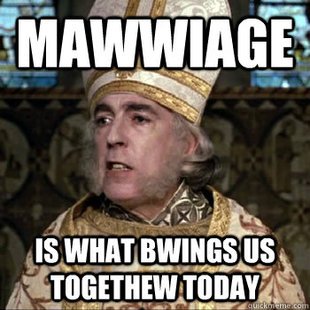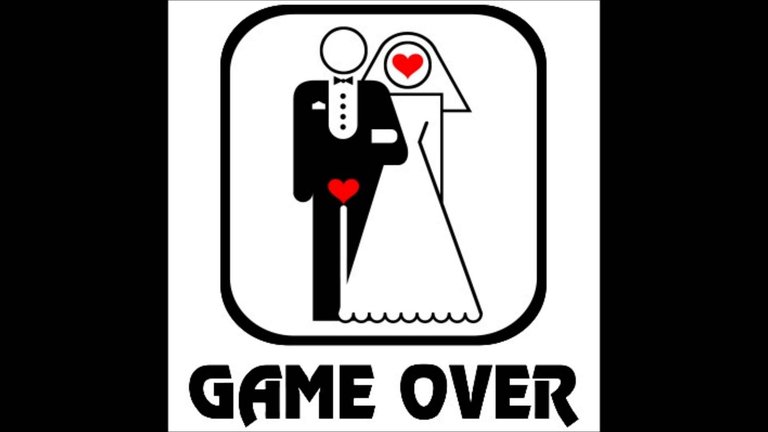
As I get older, this topic becomes more and more a part of the conversation. When I meet people and begin introducing myself, they always want to know what I do for a living and whether or not I am married. I find myself asking why these two things seem so important as definitions as to who a person is in society.
Sure, seventy years ago it was very common for people to get married and start a family, but as time changed and women have acquired more rights, the necessity has evolved into a choice. It's no longer a box you must check on a Bucket List.
I actually think that marriage has very unrealistic expectations. How is it possible for one person to fulfill so many roles in another person's life? It's okay to have a best friend in your partner, but can you really believe that you will be together "until death do you part"?
![marriagegameover.jpg]
( )
)
I guess I also have an issue with labels. Is it normal to identify another person as "your husband/wife"? As if there is some sort of ownership over one another!
I'm curious what others think about the topic. Has marriage become obsolete, or is it just not a priority as much as it once was.
I believe the customary institution of marriage evolved into existence, evolved into new forms, and is likely to evolve even further, or die, and maybe revive, and so forth. I respect your choice on whether it is right for you, as is, or with changes, or not at all. Since modernity, contraceptives and the longer human lifespan have somewhat shifted the ground from which earlier forms of marriage sprang. However, marriage does work for me.
While I'm certainly willing to believe something mindlike (a "God"?) made math and physics ("Creation"?) true somehow, and I therefore don't quite fit the definition of an atheist, I reject the idea that the Bible or any other holy anthology has divine authority, basing my rejection on contradictions and superstitions in the contents thereof. However, because Christians don't reject the Bible's authority, I feel they should pay more attention to what the canon they claim to believe actually says.
On marriage, the Bible is absolutely clear that forms and aspects of marriage have differed from one era of history to the next.
In Genesis 38, and in Deuteronomy 25, a marital rule requires a dead man's younger brother to impregnate the dead man's wife, at least if the brothers dwelled in the same household. Yet in Mark 12, Matthew 22, and Luke 20, when the Sadducees ask Jesus about this rule, he holds it of but little account, and of no account in Heaven. In Luke 20:35 he says that even in this life, the rule in question does not apply to "those who are accounted worthy to attain to that age." Christians have rarely considered impregnation of the widow a brotherly duty since then. By and large, this aspect of the marriage institution has changed.
In 1st Corinthians 7, Paul recommends living outside marriage in a celibate life of chastity, but says that all others should practice monogamy, with conjugal rights between husband and wife. Yet in Genesis 16, God endorses the giving of Hagar to Abram as his second wife; and in 2nd Samuel 3, David has six wives, but does not incur God's anger until he takes Uriah's wife Bathsheba as his own in 2nd Samuel 11. So it is clear that the choice between celibacy and monogamy advocated by Paul was not the rule in earlier Biblical times, when polygamy was practiced with but little blame, and some approval.
In Deuteronomy 24, the rules of marriage allow a man to divorce his wife by so declaring in a certificate that he gives her before sending her away. Yet in Mark 10 and in Matthew 19, Jesus explicitly calls this kind of divorce a violation of God's will reflecting a compromise by Moses with popular immorality: "For your hardness of heart he wrote you this commandment." Jesus dares break with Mosaic law in only a few instances; this is among the sharpest. By New Testament rules of marriage, divorce is a sin, yet not so by the Old.
Surprisingly many Christians argue that Bible treats the customary institution of marriage as unchanging. In making that argument they utterly defy the plain meaning of their Scriptures. However, English translations of the Bible are abundant, in print and online. Thus you have the power to test my assertions, and theirs, against the Biblical evidence.
• A man's duty to impregnate his older brother's widow: the Bible records that this aspect of marriage underwent change.
• Polygamy sometimes accepted, versus a choice required between celibacy and monogamy with conjugal rights: the Bible records that this aspect of marriage underwent change.
• Divorce acceptable on the ex-husband's written word, versus blaming divorce as actually sinful: the Bible records that this aspect of marriage underwent change. Of course, there has been further evolution here: divorce in modernity is acceptable again, though it's no longer the ex-husband who certifies it.
Therefore, @phoebeglen, your hilarious use of the lisping meme from The Princess Bride is entirely apt. Marriage is a mere option in flux, which evolved among flawed and fallible unguided humans, rather than being the eternal estate so often, and so baselessly, proclaimed.
Thank you for your comment. I really enjoyed reading it. :oD
Excellent post; and in your somewhat agnostic state offers more insight than many theologians are able to do.
That said, you summed things up nicely:
Few have said this better.
As a Christian, I believe God had a Perfect Plan. As I think about Adam and Eve, pre apple, zero mention was made about the conjugal experiences of the two. Pre apple they enjoyed the freedom of fully bared skin without shame.
So, post the apple, they were cast out, and this is when God put the marriage clause in affect. It was almost a form of punishment for their disobedience. The woman would have pain in childbirth, the husband would work by the sweat of his brow. It wasn't exactly the primrose path engaged couples dream of.
Fast-forward through generations and centuries, as noted in the quote, flawed people rewrote the laws to fit their needs and greeds.
Marriage has so many benefits for the extremely fortunate who've found a common ground and made peace with the God-covenant in love.
As you note, divorce was an addendum to the original plan. It comes with many consequences, which few people ever discuss; including many caveats for remarriage that most people regretfully ignore.
Long story short, I really enjoyed reading your insightful post. I learned a thing or two.
Thanks for sharing.
Peace.
I’d say it depends on your spiritual beliefs. Of course, it doesn’t change the right and wrong of things. If you’re an atheist, I wouldn’t expect you to consider the Christian belief of much ‘value’.
I’m sure each faith has its precepts on the topic. Understandably, there are some atheists who value the traditions of marriage without the ‘spiritual’ aspect.
That said, as a Christian, I will offer you one of several Bible verses making it clear that marriage is not optional or obsolete.
Genesis 2: 22-24
22 Then the LORD God made a woman from the rib He had taken out of the man, and He brought her to the man. 23 The man said, “This is now bone of my bones and flesh of my flesh; she shall be called ‘woman,’ for she was taken out of man.” 24 That is why a man leaves his father and mother and is united to his wife, and they become one flesh.
Jmho, but, on the secular side, marriage keeps things 'straight'. It keeps the baby-mama drama down, std's less likely, HIV-AIDS numbers down, property rights, etc., etc.
Celibacy is God's ideal; but, He says "it's better to marry than to burn." (1 Corinthians 7:9)
Peace.
Thank you for your input.
✌